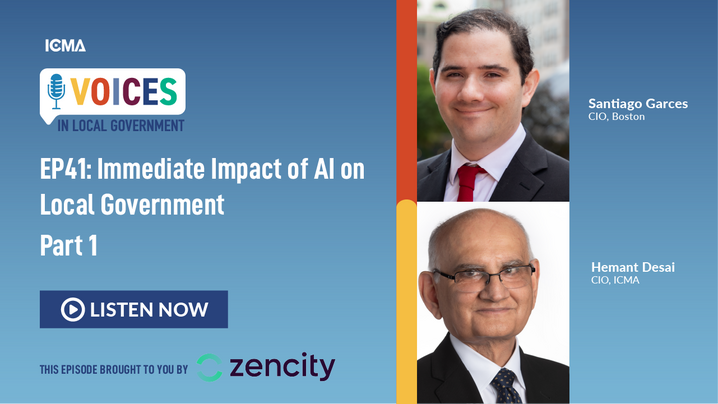In the evolving landscape of local governance, the emergence of Artificial Intelligence (AI) marks a transformative era. We’ve summarized the discussion with Joe Supervielle, Santiago Garces, and Hemant Desai, shedding light on the immediate impact of AI in local government. Their insights reveal the breadth of AI’s influence. From enhancing employee and resident services to navigating the complexities of vendor selection and ethical considerations.
Demystifying AI: Beyond Siri and Alexa
AI encompasses more than the familiar voices of Siri and Alexa. Santiago Garces, CIO of Boston, points out, AI’s vast domain is revolutionizing how local governments approach data and content creation. AI’s power lies in its ability to predict outcomes, generate new content, and offer creative solutions to longstanding problems. Hemant Desai emphasizes the importance of understanding AI’s potential beyond its novelty, recognizing its role in making data analysis and creative problem-solving more accessible and powerful.

Practical Applications of AI in Local Government
Local governments stand at the threshold of integrating AI into various facets of their operations. The ability to use AI for projects such as brainstorming policy ideas and enhancing communication with residents, underscores its versatility. Garces likens AI’s utility to that of spreadsheets, highlighting its fundamental role in processing language and text.
The key is to identify clear problems AI can solve, ensuring the technology is applied effectively and responsibly.
Navigating Vendor Selection: The Challenge of AI Washing
One of the critical challenges local governments face is discerning the value of AI solutions amidst the hype. Hemant Desai introduces the concept of “AI washing,” where vendors may overstate the AI capabilities of their products. This underscores the necessity for local governments to ask probing questions and involve IT experts in the evaluation process. Garces further advises focusing on the problem to be solved rather than being swayed by the allure of AI. He suggests that the right solution may not always involve the most advanced technology.
Embracing AI with Open Tools and Scaling Solutions
Contrary to assumptions about the cost of adoption, Garces reveals that Boston has spent minimal amounts on AI. The have accomplished this feat by utilizing free tools available to all. This democratization of AI technology means local governments, regardless of size or budget, can experiment and learn about AI’s capabilities and limitations. The conversation shifts towards the potential for AI to evolve, with platforms like OpenAI and Bard offering free access to powerful AI tools, though the future of such accessibility remains uncertain.
Defending Against and Leveraging AI in Public Discourse
As local governments embrace AI, they must also prepare for its potential misuse, especially in public discourse. Garces stresses the importance of awareness and understanding AI’s capabilities as the first line of defense against misinformation. This calls for a balanced approach to governance, where AI’s benefits are harnessed while mitigating its risks.

Guiding Responsible AI Use
The discussion concludes on the topic of establishing guidelines for AI use within local governments. Both Desai and Garces advocate for creating guardrails that encourage responsible experimentation without stifling innovation. This involves drafting documents that outline the dos and don’ts of AI use, promoting an environment where employees can explore AI’s potential while adhering to ethical and practical boundaries.
Conclusion
The immediate impact of AI on local government is profound and multifaceted. From enhancing service delivery and creativity to navigating the challenges of vendor selection and ethical considerations, AI offers both opportunities and challenges. As local governments navigate this new landscape, the insights from Garces and Desai offer valuable guidance on leveraging AI responsibly and effectively.
The journey of integrating AI into local governance is just beginning, and it promises to reshape how public services are delivered and how communities interact with their governments.
For further exploration on AI’s role in local government, attendees are encouraged to register for ICMA’s Local Government Reimagined conferences where AI will be further explored.
Helpful Links
In navigating the vast possibilities AI presents, local governments are tasked with the dual responsibility of embracing innovation and ensuring ethical, equitable, and effective use of technology.
The insights from experts provide a roadmap for this journey, emphasizing the importance of clarity, purpose, and responsible experimentation in harnessing AI’s full potential.





Leave a Reply